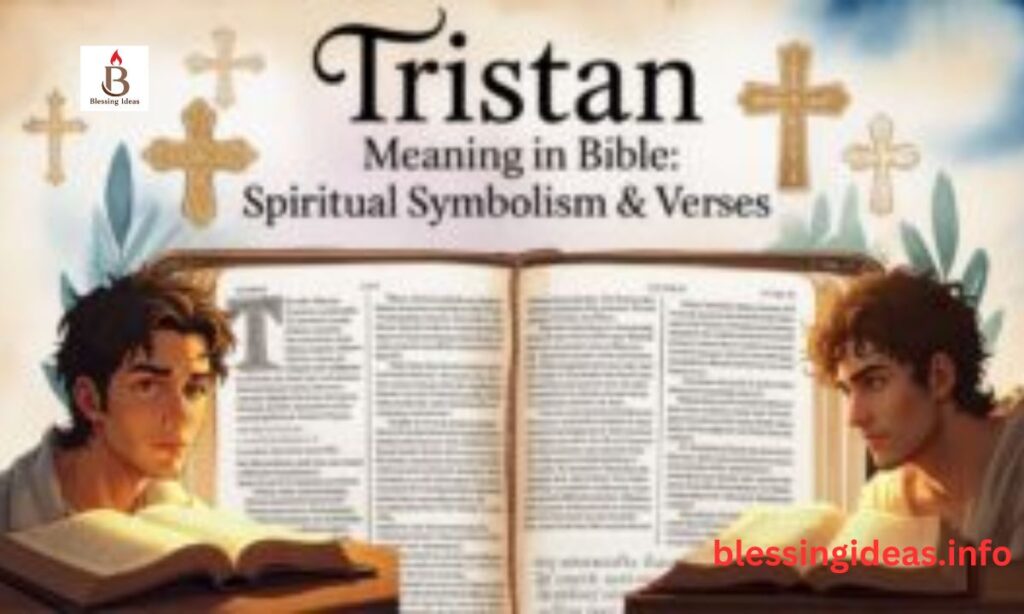Some names carry stories. Tristan is one of them. It holds sorrow and strength together. It speaks of pain that leads to purpose.
The name Tristan is not in the Bible. Yet its meaning connects to God’s Word. It reflects truths about faith and trials. It shows how God turns sadness into hope.
This article explores Tristan’s spiritual meaning. We will look at its roots and symbols. We will see how it connects to biblical truths. Even without being in Scripture, it reminds us of God’s power to heal.
Is Tristan Mentioned in the Bible?
The name Tristan does not appear in the Bible. No person in Scripture carries this name. No verse mentions it directly. Yet the name still holds spiritual weight. Tristan comes from Latin roots meaning sorrowful.
This connects to many Bible stories. The Bible shows how God uses sorrow for growth. He turns pain into strength and weakness into faith. We see this in Job’s life. He suffered but stayed faithful. David cried out in the Psalms during hard times.
Paul faced many trials yet trusted God. Their stories show sorrow leading to victory. For believers, Tristan can be more than a name. It can remind us that no pain is wasted. God can turn every trial into testimony.
Tristan in the Bible: Biblical Significance and Spiritual Insights
Though Tristan is not a biblical name, it carries rich meaning. Its roots connect to spiritual truths. When viewed through faith, it reflects God’s power to redeem. Below is a breakdown of its significance.
| Aspect | Explanation |
| Name Origin & Meaning | Tristan comes from Latin “tristis” meaning sorrowful. It reminds us of struggles but also points to hope and redemption in God. |
| Biblical Connection | Connects to themes of sorrow and restoration. Reflects Psalm 30:5—weeping may last for a night, but joy comes in the morning. |
| Spiritual Symbolism | Symbolizes trials and brokenness. Shows how God transforms sorrow into strength through faith and trust. |
| Moral Lessons | Teaches that sadness can have meaning. God uses struggles to refine character (Romans 5:3-4). |
| Faith Application | A call to surrender sorrow to God. Trust Him to turn pain into peace and weakness into testimony. |
| Christ-Centered Insight | Christ bore sorrow and suffering (Isaiah 53:3). The name points believers to Jesus for comfort and healing. |
| Spiritual Encouragement | A calling to overcome sadness with hope. Live as a witness of God’s transforming grace. |
| Prophetic Reflection | Represents the journey from mourning to dancing (Psalm 30:11). God rewrites painful stories into testimonies of victory. |
Origin and Etymology of Tristan
The name Tristan is not in the Bible. But its origin gives it deep meaning. It speaks of sorrow and inner strength. It reflects a journey of faith and courage.
Tristan comes from two main roots. One is Latin, the other Celtic. Each brings a different layer of meaning. Together, they create a name of weight and purpose.
The Latin root speaks to inward emotion. The Celtic root speaks to outward courage. When combined, Tristan becomes a name of depth. It reflects both feeling and action in faith.
Latin — Tristis (“sorrowful”)
Tristis is a Latin adjective. It means sad or sorrowful. The related noun is tristitia. That means sorrow or grief. Many Romance languages keep this root today.
Spanish uses “triste” for sad. French also uses “triste.” Italian has “triste” as well. The root is common across cultures. It has lasted through centuries.
As a name element, it brought weight. It gave a sense of solemn feeling. In Christian thought, sorrow can point to repentance. It can show humility or redemptive suffering. Naming pain is an honest act.
In medieval times, it could mark someone who suffered. It could describe someone with deep feelings. Spiritually, the Latin root highlights inner emotion. It invites reflection, compassion, and growth through hardship.
This side of the name is quiet. It is personal and reflective. It speaks of the heart’s condition. It honors the reality of pain. And it opens the door to healing.
Celtic — Drustan / Trystan (boldness, tumult)
Forms like Drustan and Trystan appear in old records. They are found in Old Welsh and Breton sources. These Celtic forms carry ideas of boldness. They suggest action or tumult.
The name is linked to medieval romance. It appears in the Tristan and Isolde cycle. In legends, it often marks a warrior. It can also mark a lover or tragic hero. Someone who acts boldly and bravely.
As a root, it adds movement to the name. It adds courage and public-facing strength. The Celtic layer gives Tristan loyalty. It gives daring and dramatic fate. Scholars note meanings vary by region and time.
Bible Verses That Reflect Tristan’s Meaning
The name Tristan speaks of sorrow, courage, and hope. While not found in the Bible, its meaning connects deeply with God’s Word. These verses show how trials can lead to strength. They remind us that faith can turn pain into purpose.
Romans 8:18 (NIV) – Suffering to Glory: “I consider that our present sufferings are not worth comparing with the glory that will be revealed in us.” This verse reminds us that suffering is not the end. Greater joy is promised for those who endure. It matches Tristan’s message of hope after hardship.
Sorrow often teaches trust in God. It shapes character and strengthens faith. Tristan’s meaning reflects this process of growth. Many verses in the Bible speak to this truth. God does not waste our pain.
James 1:12 (NIV) – Enduring Trials: “Blessed is the one who perseveres under trial because, having stood the test, that person will receive the crown of life that the Lord has promised to those who love him.” This verse shows the blessing of endurance. It speaks of reward after testing. Tristan’s meaning carries the same spirit of perseverance.
Faith can bring peace even in loss. God uses every season for His purpose. Tristan’s meaning points to this hope. The Bible gives many promises for the sorrowful. Each one offers comfort and direction.
Job 1:21 (NIV) – The Lord Gives and Takes: “The Lord gave and the Lord has taken away; may the name of the Lord be praised.” This verse reflects worship in the middle of pain. Job’s faith stayed strong in loss. Tristan’s meaning connects with this heart of trust.
Trials test and shape believers. They prepare us for greater things. Tristan’s meaning reminds us of this truth. It speaks of courage through challenges. It calls us to remain faithful when life is hard.
Matthew 17:20 (NIV) – Faith Moves Mountains: “If you have faith as small as a mustard seed… nothing will be impossible for you.” This verse shows the power of faith, even in small measure. It speaks of victory despite weakness. Tristan’s meaning carries this hope and boldness.
God’s promises give strength in sorrow. His Word turns pain into peace. Tristan’s meaning reflects these truths. Each verse is a reminder that no hardship is wasted. God is always working for our good.
Psalm 34:18 (NIV) – The Lord is Close to the Brokenhearted: “The Lord is close to the brokenhearted and saves those who are crushed in spirit.” This verse shows God’s care for the hurting. It is comfort for those in sorrow. Tristan’s meaning fits this promise of compassion.
Summary of This Section
The verses connected to Tristan’s meaning show how God works through sorrow. They remind us that pain can lead to strength. Faith grows when we trust Him in trials. Each promise brings hope for a better ending.
God does not leave us in our pain. He walks with us through it. He transforms it into something beautiful. Tristan’s meaning reflects this journey. It is a journey from weeping to rejoicing.
These verses are not just words. They are living promises. They apply to every believer’s life. They give hope when hope seems lost. They give strength when strength is gone. And they remind us that God is faithful.
Spiritual Symbolism of the Name Tristan
The name Tristan holds deep meaning. It tells a story of life’s struggles and victories. Each part shows growth through faith. It reflects a journey of hope and redemption.
This symbolism shows that challenges can change us. With God’s help, sorrow can turn into joy. Pain can shape purpose. Faith can bring healing and peace. Tristan is a name of transformation.
The spiritual journey reflected in Tristan is not quick. It is a process. It takes time, prayer, and trust. But the end result is beautiful. It is a life shaped by God’s grace.
Sorrow → Strength
Sorrow can feel heavy and endless. But in God’s hands, it can make us strong. It teaches patience and endurance. Tristan reflects this transformation. Sorrow is not the final chapter.
Strength is built through hard seasons. Every trial adds to inner courage. God lifts the weary and gives hope. Tristan stands for rising above sadness. It is a name of victory over grief.
When we face sorrow, we have a choice. We can let it crush us. Or we can let God use it. Tristan reminds us to choose faith. To let sorrow become strength in God’s hands.
Trials → Trust
Life’s trials can shake our hearts. But they also invite us to trust God more. Trust grows when we see His faithfulness. Tristan reflects this deep reliance. Trials are not meant to destroy us.
In trials, faith becomes stronger. We learn God never leaves us alone. His promises guide us through storms. Tristan shows trust built in hardship. It is a name of unwavering faith.
When everything falls apart, trust holds us together. It is the anchor in the storm. Tristan represents this anchor. It reminds us that God is always in control. Even when we cannot see the way forward.
Pain → Purpose
Pain is never wasted in God’s plan. It can open doors to help others. It shapes us into compassionate people. Tristan speaks of this journey. Pain becomes a tool for God’s glory.
Purpose often comes from life’s hardest moments. Lessons learned can inspire and heal. God can use our past for good. Tristan shows how pain finds meaning. It is a name of redemption.
Many believers find their calling through pain. They help others who are hurting. They speak words of hope and comfort. Tristan reflects this ministry. It is a name that turns wounds into witness.
Faith → Restoration
Faith is the key to healing. It brings hope when life feels broken. God restores what is lost. Tristan reflects this renewal. Faith opens the door to new beginnings.
Restoration is a promise from God. He can make all things new again. Faith keeps us believing in His power. Tristan stands for fresh beginnings. It is a name of hope reborn.
No matter how broken life becomes, God can restore it. He is the God of second chances. Tristan reminds us of this truth. It is a name that speaks of resurrection and new life.
Is It a Good Christian Name?
Yes, Tristan is a good choice for a Christian name. It carries deep values of faith and hope. Even if it is not in the Bible, its meaning reflects God’s truth. It speaks of strength, trust, and restoration.
Choosing Tristan reflects perseverance. It shows enduring hardships with faith in God. It reflects redemption. It shows sorrow turned into joy. It reflects spiritual resilience. It shows standing strong in trials.
As believers, we know God values the heart more than the exact name. Tristan shows a journey from pain to peace. It can inspire faith and hope in those who hear it. It is a name with a message of God’s grace.
Many Christian names are not found in the Bible. What matters is the meaning and the heart behind it. Tristan carries a message of hope. It carries a message of faith. It carries a message of God’s redeeming power.
Tristan in Legends vs Christian Truth
The well-known tale of Tristan and Isolde comes from medieval literature. It is a romantic yet heartbreaking story. It tells of deep love, betrayal, and a tragic end. The legend is filled with drama and emotional passion.
While it captures the imagination, its message is very different from God’s Word. In Christian faith, the meaning of life, love, and trials is deeper. It is stronger and filled with eternal hope. The legend ends in despair. The gospel ends in victory.
In the legend:
- Love is ruled by feelings and desires, not lasting commitment.
- Sorrow leads to loss and hopelessness, not healing.
- Fate is seen as the ultimate ruler, not God’s divine plan.
But in Christian truth:
- Love is grounded in sacrifice, selflessness, and covenant promises.
- Sorrow is not the end but a door to restoration and new beginnings.
- Trials are part of God’s purposeful design, not random events.
In the legend, love is ruled by feelings and desires. It is not grounded in lasting commitment. Sorrow leads to loss and hopelessness. There is no healing. Fate is seen as the ultimate ruler. Not God’s divine plan.
Frequently Asked Questions
What is the meaning of Tristan in the Bible?
It represents perseverance, hope, and trusting God through trials and sorrow.
What is the meaning of Tristan?
Tristan means “sorrowful” from Latin or “bold” from Celtic origins.
Is the name Tristan good?
Yes, it’s a meaningful name when tied to Christian values of faith and resilience.
Does Tristan mean brave?
In Celtic interpretations, it can mean bold or courageous.
What is the Tristan meaning in Bible verse context?
It reflects enduring trials with faith, similar to Job, David, and Paul.
What is the Tristan meaning in Greek?
Tristan has no Greek origin, so no direct meaning in that language.
What is the Tristan meaning in Hebrew?
It does not have Hebrew roots or biblical origin.
What does the name Tristan say about personality?
It suggests someone strong, resilient, faithful, and compassionate.
How is Tristan pronounced in the Bible context?
It’s pronounced TRIS-tan, the same as in general usage.
What is the Tristan meaning in Bible Catholic interpretation?
Catholic meaning aligns with Christian values—strength and faith through trials.
What is the Tristan meaning in Hindi?
It’s not a traditional Hindi name, so meaning varies in that culture.
Is the name Tristan in the Bible?
No, it is not directly mentioned in Scripture.
Conclusion
The name Tristan may not be found directly in the Bible. But its values can reflect strong Christian truths. When seen through the lens of faith, it carries themes of endurance. It carries redemption and hope in God’s plan.
Rather than being defined by old legends, it becomes a symbol. It is a symbol of strength and trust in divine purpose. It is a symbol of God’s power to transform. It is a symbol of faith that overcomes.






